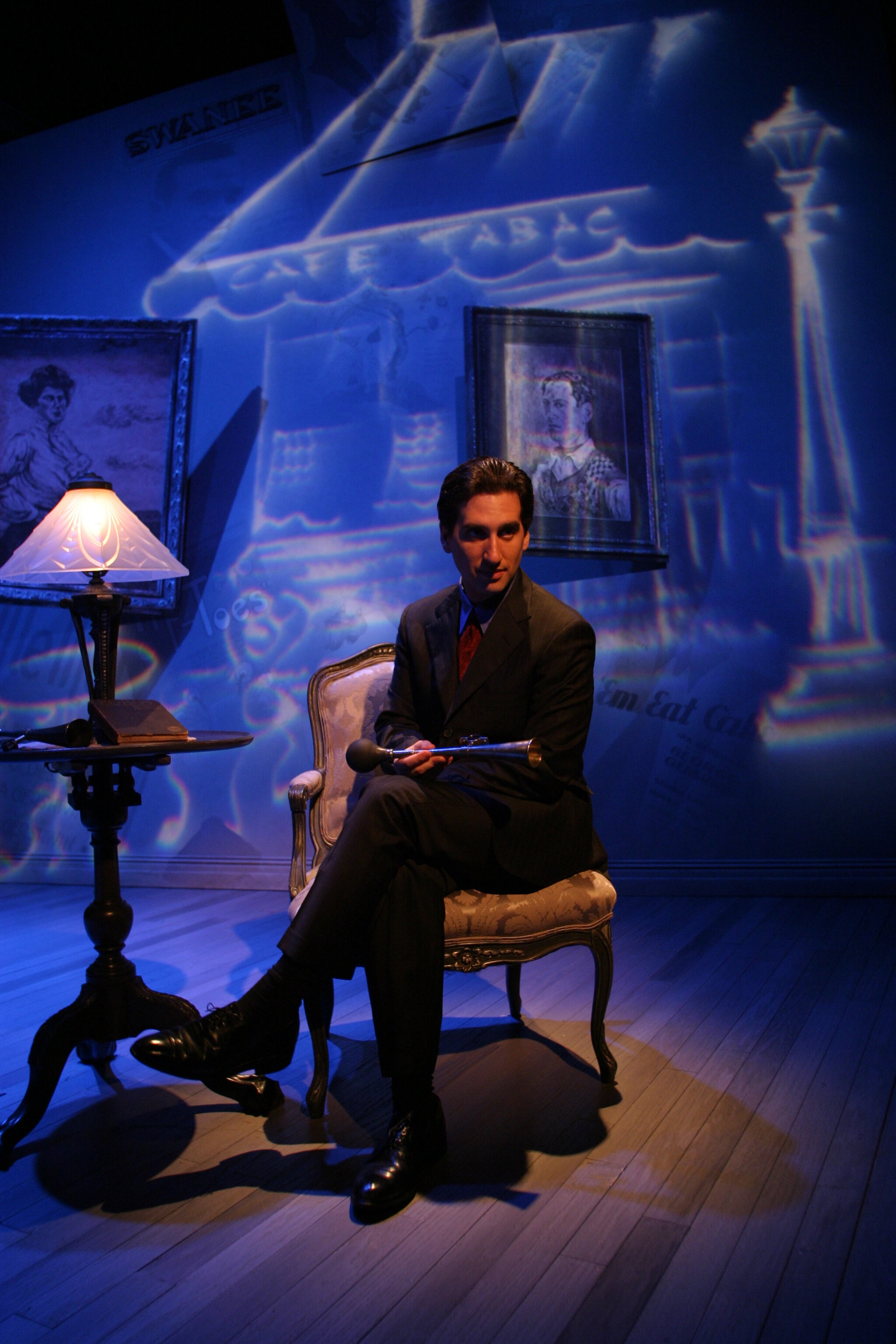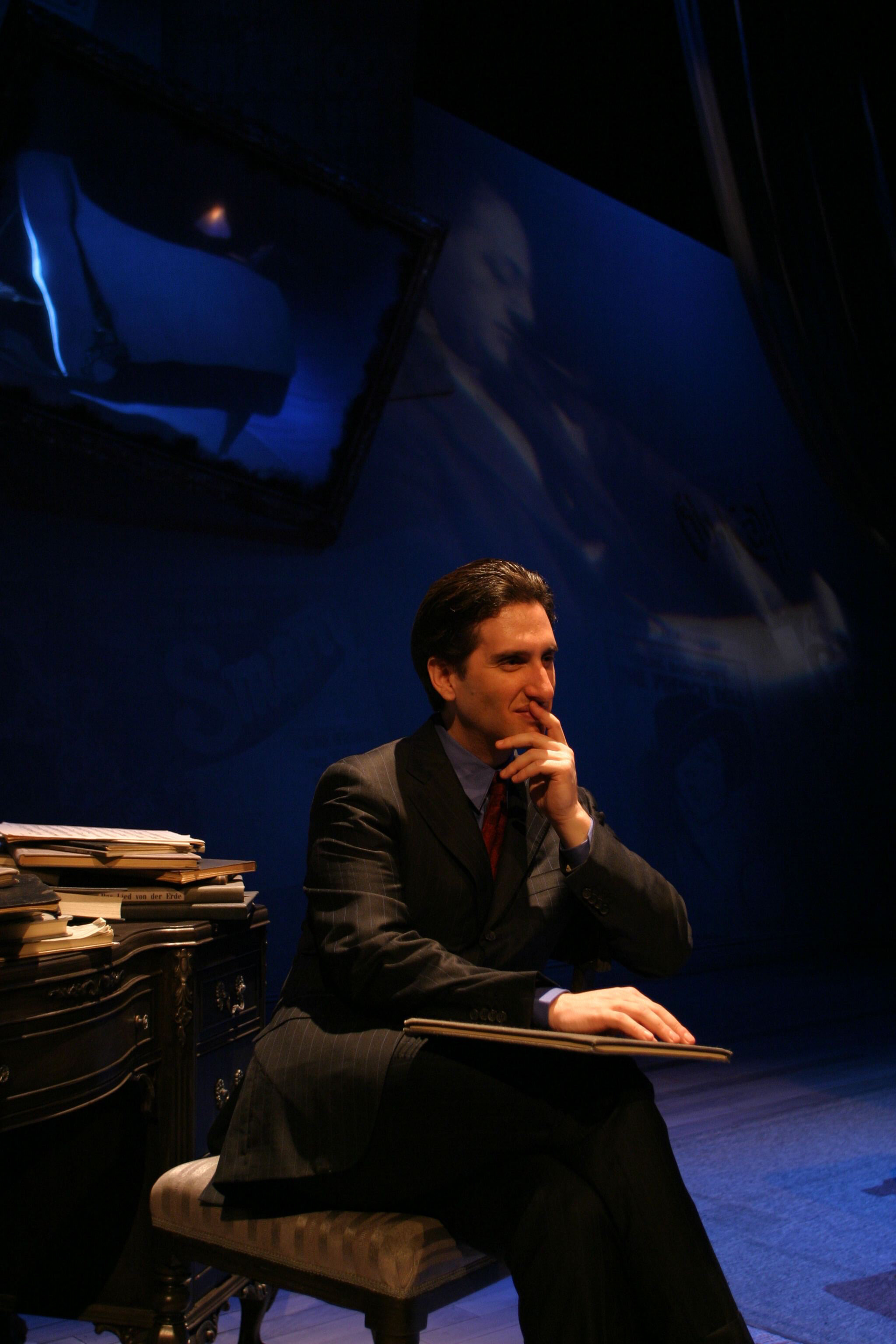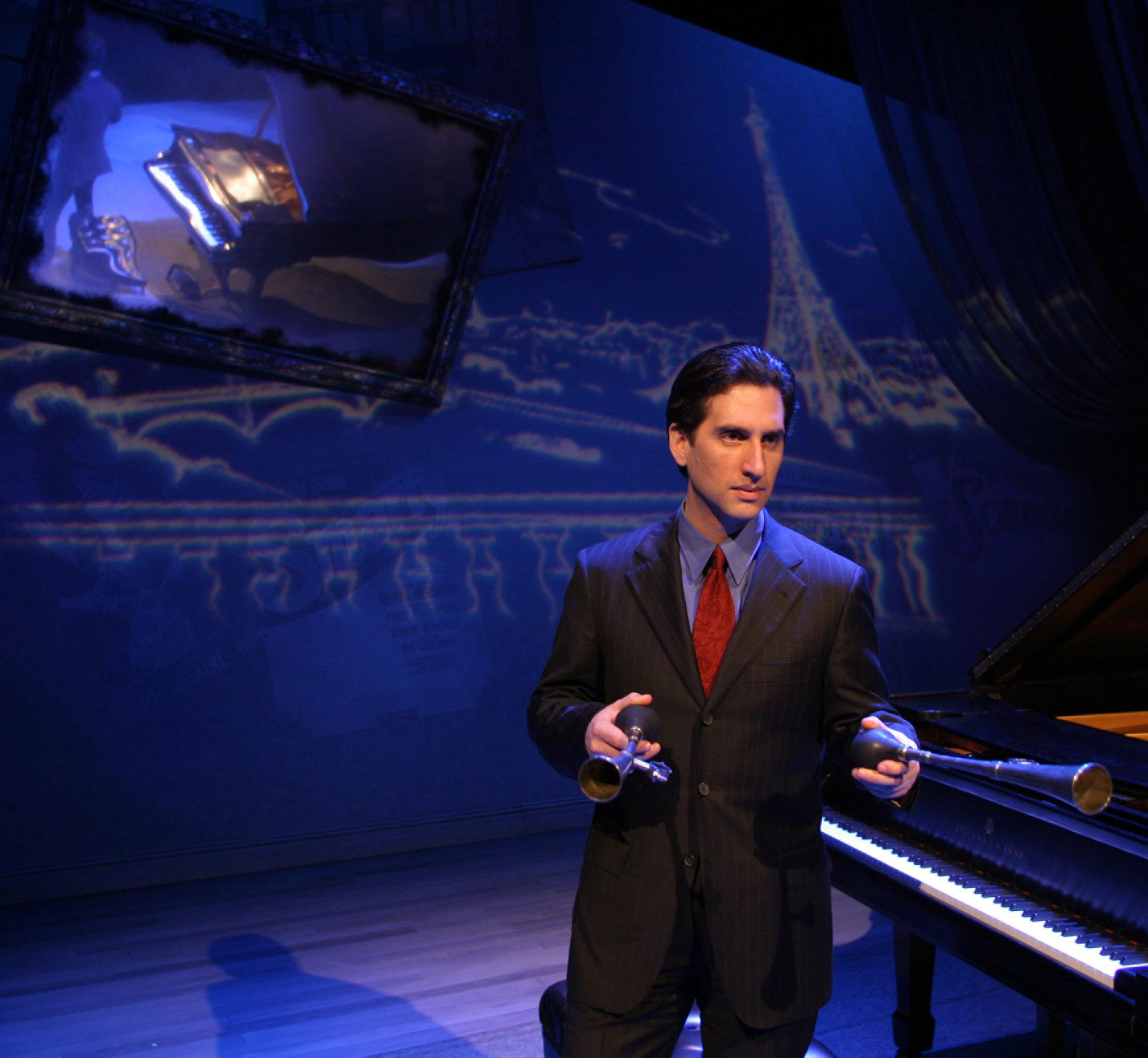
HERSHEY FELDER AS GEORGE GERSHWIN ALONE

ABOUT THE SHOW
Music & Lyrics by George Gershwin and Ira Gershwin
Book by Hershey Felder
Directed by Stefano de Carli and Hershey Felder
Adapted from the stage play directed by Joel Zwick
George Gershwin Alone tells the story of America’s great composer who, with the groundbreaking “Rhapsody in Blue,” made a “Lady out of Jazz.” The show incorporates the composer's best-known songs from “The Man I Love” and “Someone to Watch Over Me”, through the hits of An American In Paris and Porgy and Bess, to a complete performance of “Rhapsody In Blue”. As the only actor-musician to create the role of George Gershwin on the stage, and with over 3,000 performances, from California to Broadway to London’s West End, for the first time, Hershey Felder will bring George Gershwin to life on the stage of one of Europe’s oldest and most famous theatres, and we will bring the show to you LIVE from Florence, Italy, on Sunday, September 13th, 2020.
George Gershwin was born in 1898 to Russian-Jewish immigrant parents in Brooklyn. Together, he and his brother Ira wrote standards such as “The Man I Love,” “Someone to Watch Over Me,” “Embraceable You,” “Fascinating Rhythm,” “I Got Rhythm,” “’S Wonderful” and “They Can’t Take That Away from Me.” His groundbreaking opera, Porgy and Bess, is now considered an American classic. All told, George Gershwin wrote more than 1,000 songs for the stage and screen as well as works for the opera house and the symphony orchestra. In 1937, Gershwin died of an undiagnosed brain tumor at the age of 38, never knowing how famous and beloved he and his work would become.



PRESS ARTICLES
BROADWAY WORLD
“Review: Hershey Felder as GEORGE GERSHWIN ALONE LIVESTREAM from Florence. Felder's 3rd LIVE FROM FLORENCE Livestream is his best yet.”
There have been more than 40 productions worldwide of Hershey Felder as George Gershwin Alone numbering more than three thousand performances. These articles are from the most recent production, Summer 2019.
BROADWAY WORLD
“Review: HERSHEY FELDER AS GEORGE GERSHWIN ALONE at Berkshire Theatre Group is S'wonderful, S'Marvelous, and Magnificent.”
THE BERKSHIRE EAGLE
“Review: Hershey Felder casts a spell as George Gershwin”
IN THE SPOTLIGHT
“Review: Berkshire Theatre Group, Hershey Felder as George Gershwin Alone”
SOMETIMES LITTLE MIRACLES CAN HAPPEN
How GEORGE GERSHWIN ALONE - LIVE FROM FLORENCE came to be.
Allow me to invite you along on this one…
With the Live Broadcasts of Beethoven and Berlin behind me, theatres and patrons from hither and yon began asking about a "season" of such broadcasts.
I figured that starting off the season with a character and music that audiences have seen from me for over 20 years might be a way to go. I thought that a good character for these complicated times would be the one and only George Gershwin in the play GEORGE GERSHWIN ALONE.
I got together with my team - we chose a date, Sunday September 13th, - and began the planning. This is a production I have performed more than three thousand times throughout the world in theatres rather large, but the question for these times is, how to bring the story of this man into people’s 'homes,' in an interesting and creative way that’s both intimate, and true to the origins of the piece?
I began thinking of the piece itself. There is a subtext to George Gershwin’s story that I made every effort to consciously underline from the very first production, whether it be his own self doubt coupled with a certain brashness about his art, along with his questioning of what he really did owe his great success to - and did he deserve any of it, in that he adopted a musical vernacular that wasn't entirely his own, but "Made a Lady Out Of Jazz." George Gershwin was a genius, and with genius comes many questions, both his, and ours.
The piece itself is set in some theatrical “afterlife,” - a moment beyond the living, and a step before the tomb, a “musical limbo” so to speak, where George Gershwin reviews the events and art of his life asking the pertinent questions. Is he worthy? Is he great? Were all the naysayers right? Was he the fraud he had been accused of for various reasons that still don't make much sense? Or was he the miraculous tunesmith that gave America its first world-recognized musical identity? And what if he was only the messenger for that identity, but the identity was not truly his to offer? In a simple way, the story asks all the questions we all ask of ourselves every day. What really, is rightfully, “ours?”
Without answers to his questions, George floats in time and music, in some space or other… a piano...an audience that he imagines in his mind, people weaving their way in and out of his life… and as always, music, music, music. I thought: where in Florence can I encapsulate these ideas with a sense of history and responsibility?
I made a call to my new friend Cesare. For those of you who have been following these adventures from my Italian life, you will remember that Cesare, is the Cesare of Cesare and his wife Marisa from whom I bought my new golden-toned Steinway Concert Grand. Of course, during this infamous purchase I asked Cesare what his life’s profession was when he came out with “Oh, I ran La Scala in Milan and then The Maggio Musicale in Florence.” So I called Cesare and asked him if there was a theatre he could suggest in Florence where I could embody the character of Gershwin in these unusual “limbo” circumstances.
“Let me make a call.”
Several hours later I received a note back from Cesare. He had called an old friend, a Signor Giorgetti, who is the director of all theatres throughout Tuscany. He said that he explained the situation and that Sig. Giorgetti would be waiting to hear from me the next day, and Cesare gave me his number.
The next day, a call was placed to Sig. Girogetti, and a meeting was set up for the day after at 10 am at the Teatro Della Pergola, the theatre that Cesare suggested would be the best for the Gershwin show purposes. Teatro Della Pergola is the centre of Florentine theatrical culture. The theatre was built in 1657, and has been running continuously for all these years. Around the corner is Santa Croce, where Michelangelo, Galileo and Rossini are buried. A couple of blocks down the other way is the Duomo and Battistero, and…and…and. As I drove down from my little hill from where I can see the Duomo into town, as usual my heart sped up just a bit. The majestic deep green cypress trees, the light-as-air grape vines gently displayed on wood poles offering their wares to the sun, the blooming oleander whose colors aren’t just deep and rich, but seem to have actual texture, the olive trees that seem to nod hello as you pass by… and the Tuscan hills. How to express the heartwarming beauty but to say there is something about the Tuscan hills that are at once towering and overwhelming, but at the same time intimate and personal. The hills and their beauty are very much like the Castles and Palaces and homes all throughout Tuscany, grand, and yet human. For me it is all the height of artistic accomplishment guided by nature and humanity's quest to comprehend it.
As I arrive into town, I see that there isn’t as much “bustle” as I had hoped. Granted, it is the beginning of August and Florentines tend to escape the heat of the city for the refreshing breeze of the sea, but this is different. There is a tentativeness of people on the street. There are not all that many of them. Florence is still not the Florence it was, even though lockdown has been lifted. One in every three shops is closed some with apologies for going out of business after more than a century of service to the neighborhood. And while people do go about their lives, and the feeling is not one of heaviness, there is a certain “uncertainty” that seems to pervade everything, from the frightened look on the face of the restaurateur who stands aproned at his front door watching passers by, no one entering his cafe, to the shop owner hunkered over her cash register just staring, to the waiter with only two clients for a quick coffee, to the city workmen, who for the first time in their lives are doing their public works without battling the foot-trafficking public. I arrive at 18 Via Della Pergola, just beyond the “Pergola” itself - the vine laden awning of the historic locale.
As I open the door, a gentle masked lady is standing there, and introduces herself. I figure she is going to ask me who I am there to see and what my name is. Instead she says…
“Signor Felder, Ti Stavamo Aspettando. We have been waiting for you. But first, please sign in, and let us take your temperature.”
I was so nervous, that I was afraid my temperature would go through the roof. After all I was headed into the great hallowed Teatro Della Pergola where Verdi, Mascagni, Eleanor Duse and so many more have had world premieres. I was headed into Teatro Della Pergola, where the telephone was invented! (We’ll get to that in a bit!) I was headed into a THEATRE! I had not been in a theatre in almost six full months!
The temperature thingie was quite modern - somewhat like a doctor’s office scale that you stand on, this one with a reflective video image of your face, where you are to place your face within the parameters of green lines on the video image. I paused for a moment, the machine beeped signaling that I was free to enter, and the lovely lady in the mask asked me to follow.
And if I thought my heart was beating fast, well suddenly it began to beat faster because I was walking through the underground canals of one of the oldest continuously running indoor theatres in Western Culture. And then it happened. The door opened. And I was standing in the most beautiful place in the world. I was standing on the stage of a theatre.
Signor Giorgetti approached me. I was warned that he was a true gentleman, extremely soft spoken and elegant. And that he was. More than that, he was generous, he was kind. I have no idea what my friend Cesare said to these lovely people, but one after the other, each behind masks, greeted me as if I were bringing them gifts of gold. Stranger still was experiencing all of this with every single person behind a mask. I could somewhat read eyes, but eyes are difficult to read without entire faces. I imagined what each person’s face would look like unmasked to somehow better read the expressions, but I still found it rather difficult. As the welcoming on the stage of that magnificent theatre went on, head nods and elbow bumps instead of hugs and handshakes as used to be the case in these parts, I began to realize something that was unclear to me when I entered. All of these people, from the Director of all Tuscan Theatres, to the Artistic Director of Della Pergola, to the head crewman, lighting man, stage associates… every single one of them, were all there to greet - me. I had assumed that they were all there doing some job or other, and that I was just passing through to say hello. But no. They were there, all of them, to greet - me; to talk about hosting the broadcast of "George Gershwin Alone," to let me know that they are there for anything that I need, to take me through ancient stock and prop shops to see if I need any particular props - to show me around the stage, the building… and when one of the easy-going crew guys took me to the back of the stage to show me upstage details he said:
“Thank you, thank you. We have not worked in five months, and you are the first to have us return to the theatre,”
Oh God. Don’t... just don’t start the waterworks. Because I felt the tears coming on, I bit my lip as hard as possible, and launched into my getting better but not perfect Italian about the stagehand's life and how it has been for him and the theatre all these months. I manage to stifle the tears. I don’t want them to see this. Performers: Emotions on the surface always looking for attention. Sheesh.
Another stagehand shows me a four hundred year old spiral staircase that goes all the way from the bottom of the theatre to the top. A mannequin is placed in a comedic way. We both look and laugh out loud. They have a sense of humor.
I hear chattering behind us, and it seems like folks are gathered and happy, as if they have not been this way for a good long while. They are having a good old “meet n’ greet.”
And as I head downstage I find my “Punta,” my “Point,” the vocal and communication power point, downstage just about center, where you can whisper and the whole theatre resonates - where you must do almost nothing at all and the audience comes to you.
And I look out - and I see the audience… some are staring wide eyed. Some are laughing, others with tears rolling from their eyes… some… sleeping (let’s be honest now… And then in a strange whoosh, they are all gone. The crew and staff are behind me, and there is no audience. No one is there. They are at home, behind masks, trying to survive. And that’s when it really hit me and hit me very hard - that for the first time in my life, I had not been in a theatre for almost half a year, and now, on this first return, that night there would be no audience. And there would be no audience for many many nights to come, not here, and not in most theatres throughout the entire world. And what of all the theatre workers from my life in America, what would become of them? Where do they go? What do they do without audiences? How do they survive? Their families? Parents, children, partners… what do they do? I am able to be on a stage, in one of the most beautiful theatres in the world, in the most beautiful city in the world, and I will be able to tell a story from this stage, and from these stalls, and wings… even if it is to a camera. I am, and I will be in a theatre. What of all my friends? And just as the waterworks are about to be released… the AD is next to me… a very elegant Signor Pacini, who speaks every language necessary for the purposes, and so begins in part English, French and Italian…
“There is a wonderful story about this theatre. It might not be true, but it’s a good story, and I love telling it. You see how the theatre is designed with the audience as a horseshoe… and the boxes are enclosed? This is the first theatre in history where the design is this way. This is because, as the story goes, Florentine families were always fighting and yelling at each other. So the designer of the theatre, Ferdinando Tacca, under the Patronage of Cardinal Gian Carlo de’ Medici, enclosed the boxes so… ‘at least at the theatre, the families will keep quiet.’
Then Signor Pacini pulled me over to stage right, and showed me a plaque. The plaque was erected in 2008, on the 200th birthday of a man by the name of “Meucci.” And Pacini goes on to tell me the story…
“When Meucci was a little boy, a teenager, in the early 1800’s he worked here in this theatre as a stagehand. When it was time to lower one of the flats or curtains from the fly up above, he had to scream up! Of course he did not like doing this in front of the audience, even though it was tradition… so he invented a “telephone” system whereby he could speak into a funnel and the sound would carry all the way to the fly up top and be heard. And this here - this funnel, is the very first telephone.
And it is true, Meucci was in fact the inventor of the telephone. Alexander Graham Bell was granted the patent for electromagnetic transmission of vocal sound, but it was Meucci who invented the concept of the telephone itself. In 2002, The U.S. House of Representatives honored Meucci by acknowledging that he had a hand in the development of the telephone, but the Senate did not join the resolution and so this resolution is disputed. (Figures, I guess...) But for all intents and purposes, I was standing in front of, and was able to touch, what has been acknowledged as the very first “telephone’ in the world - invented for a THEATRE!
And then Pacini, took me to Eleanor Duse’s dressing room, built directly onto the stage in 1906 for an Ibsen production, because she wanted to prepare her character and immediately walk out on stage in character. This dressing room is on stage left and has been the star dressing room ever since.
Everyone continued chatting while I walked around the theatre, touching wood, touching gilt, touching velvet, touching the boards, hearing the acoustic, touching history, and once again noticing that odd thing particular to Florence - a tremendous grandness that is also at once majestic and intimate. It is difficult to explain but one feels it deeply the moment one experiences it. I stood on the stage one last moment, then addressed the crew about what we’d be doing… and it was like we were all old friends, that we had done this before, and now we’d be doing it again in just a different version.
I realized at this point that the stage is so massive that I thought it would be ok to do something unusual. I stood at least fifteen feet away from the gathering, and then I said, that if it was all right, I would like to take off my mask, and show my appreciation for such a warm welcome with my entire face. And just as I was saying this, everyone spread out properly distancing from one another on this massive opera house stage, at once majestic and grand, yet still very intimate, and all at the same time, everyone slowly removed their masks to reveal so many beautiful warm smiles, and even a few tears.
It all seemed like a little miracle in these terribly uncertain times, but at that moment I really did believe that somehow, it's going to be ok and we just have to make it so.
I am so excited to bring you the beloved George Gershwin from my beloved Florence - Live - from one of the most beautiful theatres in the world on September 13th. In the meantime stay safe and stay healthy. And if we look after each other we’re going to be ok.

















